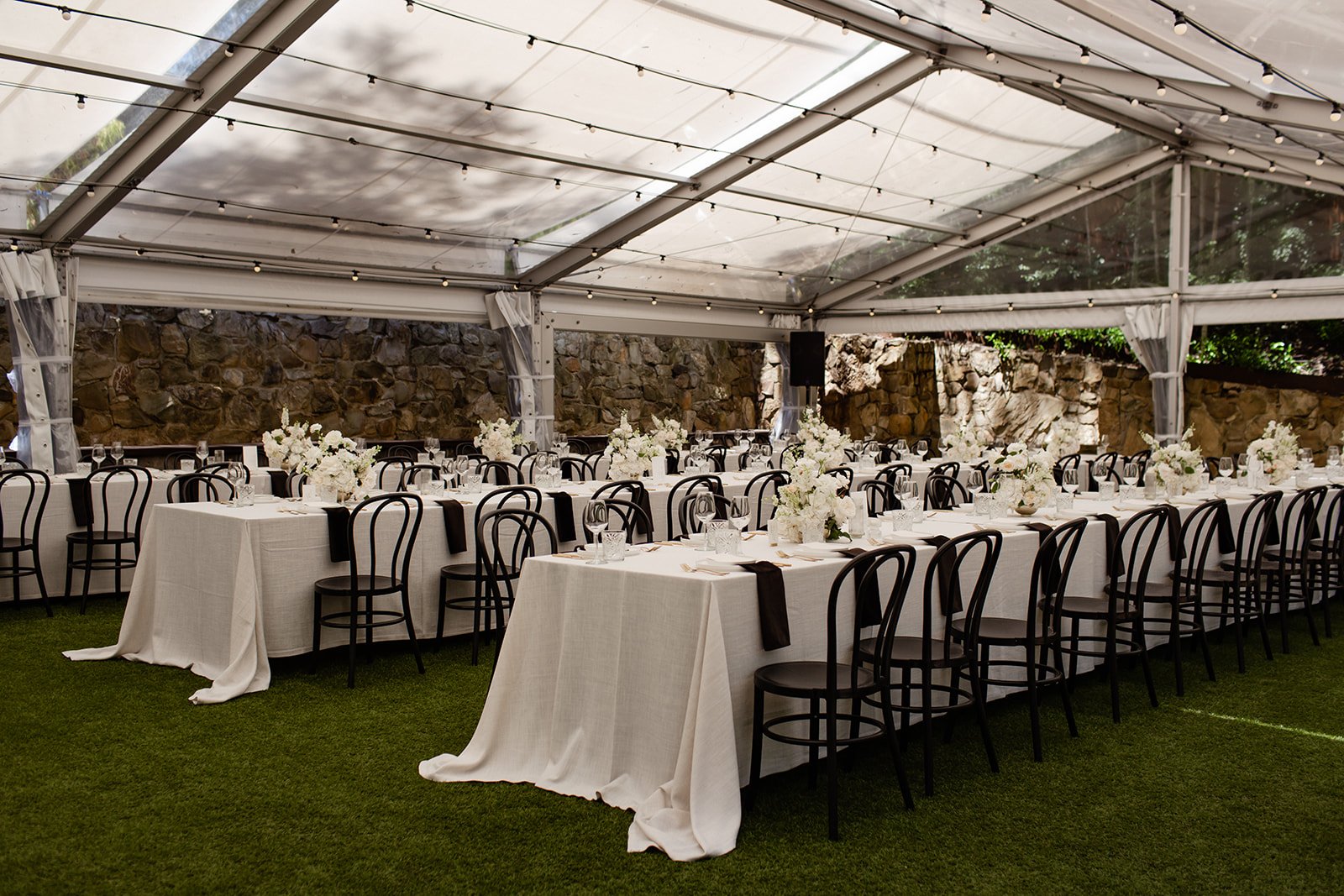Planning a Private Property Wedding - What You Need to Know
So you’ve found the perfect backdrop for your wedding, except it’s a private property… and it’s a complete blank canvas. Now you don’t know where to begin. I can start off by saying a wedding planner is now your best friend, but if you are brave enough to tackle the planning on your own, here’s what’s involved in creating a successful private property wedding.
If you feel overwhelmed after reading this post, I can promise you, you are not alone! It’s insane how many clients we’ve had book us months into their planning journey because they’ve hired a private estate and 1. didn’t know how much it would cost to bring it all together and 2. don’t know where to start. If I could have one wedding planner wish, it is to help you avoid these issues before they begin. If you are considering a private property, the most important thing you need to know is that you must budget a minimum of $120,000 towards planning and preparing the site. The second most important thing to know is that wedding planning is going to become your second job.
Here’s where the fun begins:
A full-set up at Willow and Stone Estate featuring hired tables, chairs, linens, napkins, glassware, cutlery and crockery
Assess the Property
Space and Layout: Start by assessing the property to ensure it can comfortably accommodate your guest list. Consider areas for the ceremony, reception, parking, and any additional spaces like a dance floor or cocktail area.
Accessibility: Ensure the property is easily accessible for guests, vendors, and emergency services. Consider the terrain and whether you need to provide transportation, like golf carts, for elderly or disabled guests.
Facilities: Being a property that isn’t pre-prepared for events, you’ll need to supply all of the facilities. This includes the marquee, the furniture, the crockery, dance floor tables - the list goes on. You’ll also need to supply restrooms. In the state of Victoria there is a rest room per guest count requirement that must be followed for insurance purposes (1 restroom for every 50 guests).
Permits and Regulations
Zoning Laws: If the property you’ve selected belongs to a friend or a family and is not pre-approved by the council for holding large events, you’ll need to search your local zoning laws to determine if you’re allowed to host an event on the property. Some areas have noise ordinances, guest limits, or restrictions on outdoor events.
Permits: Obtain any necessary permits for the event. This could include permits for large gatherings, parking, or serving alcohol.
Insurance: A privately hosted event must be insured. All vendors servicing the event must also be covered with public liability insurance. Consider wedding insurance to cover any potential property damage or liability issues. Check if the landowner’s insurance offers any coverage for events.
Logistics and Rentals
Tents and Marquees: Depending on the season and weather, renting a tent or marquee may be essential. Make sure it’s large enough to cover all guests and has options for heating or cooling, as well as a subfloor. A marquee in itself requires a certain amount of inclusions that marquee companies won’t tell you about - you are responsible for organising these. They include: heaters, coolers, electrical and audio/visual systems, as well as power generators.
Furniture and Equipment: Being a blank canvas, you’ll likely need to hire your own tables, chairs, linens, dance floor (if required) and any additional hospitality items to be used throughout the evening. Often, your caterer will provide crockery and glassware.
Catering: If the property doesn’t have a commercial kitchen, you’ll need to bring in catering equipment. Discuss with your caterer about setting up a mobile kitchen or renting necessary appliances.
Decor and Ambiance
Natural Beauty: Take advantage of the property’s natural beauty. Incorporate the landscape into your decor, such as using trees for hanging lights or setting up a ceremony arch against a stunning backdrop.
Personal Touches: Since it’s a private property, you have the freedom to add personal touches that reflect your relationship. Consider DIY decor, family heirlooms, or hiring a stylist who has experience working on self-managed properties and will be able to bring your vision to life..
Lighting: Good lighting is crucial, especially if your wedding extends into the evening. You’ll be responsible for organising your own lighting .
Guest Experience
Parking and Transportation: Depending on the size of the property, you’ll need to consider your guests arrival and parking. If you can’t allocate a parking area for your guests, you might want to opt for a bus service to get them there or back from a common location.
Vendors and Coordination
Vendor Familiarity: Work with vendors experienced in private property events. They’ll understand the unique challenges and logistics involved.
Day-Of Coordinator: A standard event venue will provide you with an evening coordinator to ensure everything runs smoothly. Private properties are just offering you the land, so it is your job to organise the coordination aspect of your wedding. You’ll need to consider hiring a wedding coordinator or planner can handle logistics, vendor coordination, and troubleshooting on the day of the wedding.
Backup Plan
Emergency Preparedness: Have a plan for handling emergencies. Know the location of the nearest hospital, and have first aid kits, fire extinguishers, and emergency contacts readily available.
We are here to help bring you the wedding of your dreams. If you have the budget to create a dream day from scratch, we can guide you and take care of all the background logistical tasks so that you can enjoy your life in the lead up. Contact us to get a comprehensive quote on the management of your private property wedding.

